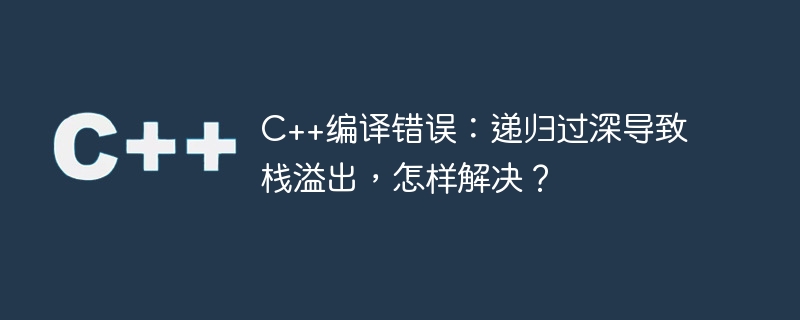

C is a widely used programming language, and it is inevitable to encounter various errors during its compilation and execution. One common mistake is to recurse too deep and cause a stack overflow.
In recursion, when there are too many recursion levels, the program will encounter stack overflow errors. This is because recursive functions require a certain amount of memory space to store local variables and function calls during each recursion. Each recursion will push these local variables and function calls into the function call stack. The size of the stack is limited. Once this limit is exceeded, a stack overflow will occur, causing the program to crash.
So, how should we solve the stack overflow caused by too deep recursion? Here are several solutions.
The essence of recursive function is a loop with backtracking, so without affecting the program logic, we can rewrite the recursive function as cycle. This can reduce the overhead caused by recursion, thereby reducing the risk of stack overflow.
For example, the following is a recursive function that calculates the Fibonacci sequence:
int fib(int n) {
if (n == 0 || n == 1) {
return n;
}
return fib(n - 1) + fib(n - 2);
}We can rewrite it in the following loop form:
int fib(int n) {
if (n == 0 || n == 1) {
return n;
}
int a = 0, b = 1;
for (int i = 2; i <= n; i++) {
int c = a + b;
a = b;
b = c;
}
return b;
}We can avoid stack overflow by setting the size of the stack space. Under Windows, this can be achieved by modifying the stack space size of the program's executable file; under Linux, you can use the ulimit command to control the stack size. One thing to note with this approach is that too much stack space will occupy system resources, so you need to weigh the pros and cons.
Sometimes, the recursive algorithm itself may have problems, resulting in too many recursive levels. In this case, we need to optimize the recursive algorithm and reduce the number of recursive calls to reduce the risk of stack overflow.
For example, the following is a recursive algorithm for solving the Fibonacci sequence:
int fib(int n) {
if (n == 0 || n == 1) {
return n;
}
return fib(n - 1) + fib(n - 2);
}We can optimize this algorithm through memoized search to reduce the number of recursive calls:
int fib(int n, unordered_map<int, int>& memo) {
if (n == 0 || n == 1) {
return n;
}
if (memo.find(n) != memo.end()) {
return memo[n];
}
int ans = fib(n - 1, memo) + fib(n - 2, memo);
memo[n] = ans;
return ans;
}
int fib(int n) {
unordered_map<int, int> memo;
return fib(n, memo);
}In recursive functions, there may be sub-problems of repeated calculations. We can avoid this using a caching mechanism to reduce the number of recursive calls.
For example, if we need to calculate a Catalan number, we can use the caching mechanism to avoid repeated calculations:
int catalan(int n, unordered_map<int, int>& memo) {
if (n <= 1) {
return 1;
}
if (memo.find(n) != memo.end()) {
return memo[n];
}
int ans = 0;
for (int i = 0; i < n; i++) {
ans += catalan(i, memo) * catalan(n - 1 - i, memo);
}
memo[n] = ans;
return ans;
}
int catalan(int n) {
unordered_map<int, int> memo;
return catalan(n, memo);
}In short, there are many ways to avoid stack overflow caused by too deep recursion. We need to use Choose the appropriate method for the specific situation. When writing recursive functions, be sure to pay attention to the depth of recursion and fully test to ensure that the program runs correctly.
The above is the detailed content of C++ compilation error: Too deep recursion causes stack overflow. How to solve it?. For more information, please follow other related articles on the PHP Chinese website!
 What are the common management systems?
What are the common management systems?
 mintui
mintui
 Which version of linux system is easy to use?
Which version of linux system is easy to use?
 What to do if an error occurs in the script of the current page
What to do if an error occurs in the script of the current page
 What are the requirements for Douyin live broadcast?
What are the requirements for Douyin live broadcast?
 Why can't I open pinterest?
Why can't I open pinterest?
 Introduction to Document in JS
Introduction to Document in JS
 What is the format of the account name of steam
What is the format of the account name of steam
 What are the enterprise erp systems?
What are the enterprise erp systems?




